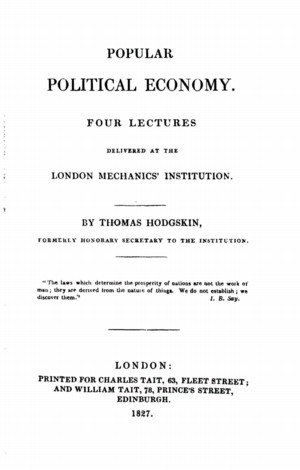
Popular Political Economy. Four lectures delivered at the London Mechanics Institution
- Thomas Hodgskin (author)
Thomas Hodgskin, an officer in the British Navy who later worked for The Economist, was one of the earliest popularizers of economics for audiences of non-economists. He gave lectures on free trade, the corn laws, and labor to “mechanics institutes” (adult education groups). Hodgskin passionately cared about the concerns of laborers. His discussions of the labor theory of value followed up on David Ricardo and pre-dated John Stuart Mill’s expositions on similar themes.